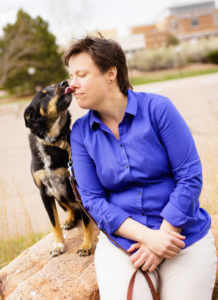CANCER IN PETS:
Fear is the Cancer, Courage is the Cure
By Karin L. Cannizzo, D.V.M., MS, Diplomate of the American College of Veterinary Internal Medicine
This is an open letter to pet owners about what we all worry about, what we never want to think about, but what we all fear: cancer in pets. I am a board-certified veterinary internal medicine specialist. I diagnose and treat cats and dogs with cancer as part of my job.
What is cancer?
The body is made of cells and when one cell begins to divide out of control, its children cells divide, and their children’s children…it’s cancer. These cells may live in one spot in the body (commonly called a tumor) or may spread throughout the body (metastatic spread). That’s the simplified definition, because cancer means different things depending on the type and location. We have to know which cancer is there to know what are our choices.
When should I be worried about Cancer?
Cancer in pets is sneaky, at least to start with, because in most cancers there are no specific changes in routine blood work. Blood work may direct the evaluation to a particular location such as the liver, but blood work can’t usually tell the difference between infection and cancer. Radiographs (x-rays) can often provide information especially about cancer spread into the lungs. Ultrasound is very useful for the abdominal cavity because it can provide more detailed information about the interior structures of the major organs, revealing details not possible through radiographs. With ultrasound we can often make a diagnosis through a guided-aspirate, a simple needle sample for the pathologist rather than a surgery.
Cancer is a worry when our pet is not getting better. I often think that our fear is worse than any cancer because fear often stops us from looking for the diagnosis when the first evaluation or treatment didn’t work. We often have pets presented to us at the Veterinary Specialty Center for evaluation for cancer and there isn’t cancer there!
As a veterinarian, I often hear this comment when we start discussing the what-ifs: “ I won’t treat him if it is cancer. I love him too much.” I am frustrated by this comment because I don’t hear it for other diseases. If this remains your belief, the illness already has you beat even if it’s not cancer. This is the time where it takes the most courage. It may seem hard to believe, but it takes as much courage to keep trying when our pets are ill as it does to let a pet go. We need to know what’s wrong with our pets so we know what we can change and what we can’t, and sometimes it is really difficult to find the courage to try.
But What if It is Cancer?
In my mind, cancers come in 2 groups: cancers that they can feel good with and cancers that they don’t. I only recommend treating cancer in pets if I think we can have our patients feel good. I have a secret pact with my patients, while I spend my time talking to their owners, my true obligation is to them. I will treat them as long as we have them feeling better.
Cancer treatment may mean a surgery. Some folks are worried by a big surgery and are concerned about “putting her through that.” I only hope that the decision to do or not do surgery is based on consultation with a veterinarian who has experience with that surgery and cancer. A couple of days in the hospital are quite a fair exchange for a year without cancer, or even a possible a cure.
Treatment may also include medications to slow cancers. In general if we can offer medications, we usually hope they work for months to 2 years. It took me a long time to appreciate how long 9 months is. When your pet is with you and feeling good, time goes fast; when your pet is being treated for cancer, time is savored, counted, and slowed with love; and when your pet is lost, time stops. The first step towards my understanding of true time was the loss of my Basset hound. I lost her suddenly to cancer and I only wish I could have had her with me, feeling good for another summer, another Christmas. Imagine a fortuneteller warning you that no matter what you did your dog would be hit by a car. Would you use a leash to walk to the park to delay the tragedy to the best of your ability or simply say that what will happen will happen? I would use a leash and I would consider treating some cancers.
Courage Is the Best Medicine
How we define success in medicine depends on the disease. In cancers, it is not always about a cure. There are types of cancer that we cannot cure. A cure means the cancer is gone and will not return. There is a strong obligation in treating cancers that we cannot cure. The obligation is to make my patient feel better and to have them feeling good throughout treatment. This means we use the safest drugs and minimize side effects to the best of our ability. I can’t have them feeling badly because that is my pact to each patient. If the cancer is not responding or the medications are having too many side effects, we can change or stop treatment. The choice to stop treatment is our most important choice. In my heart, we use the choice with love when we have the courage to ask, to hope, to try, and to know all of our choices.

